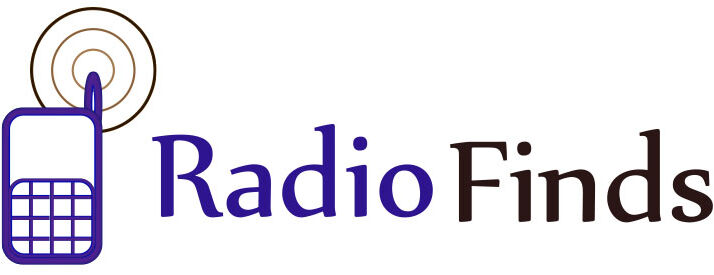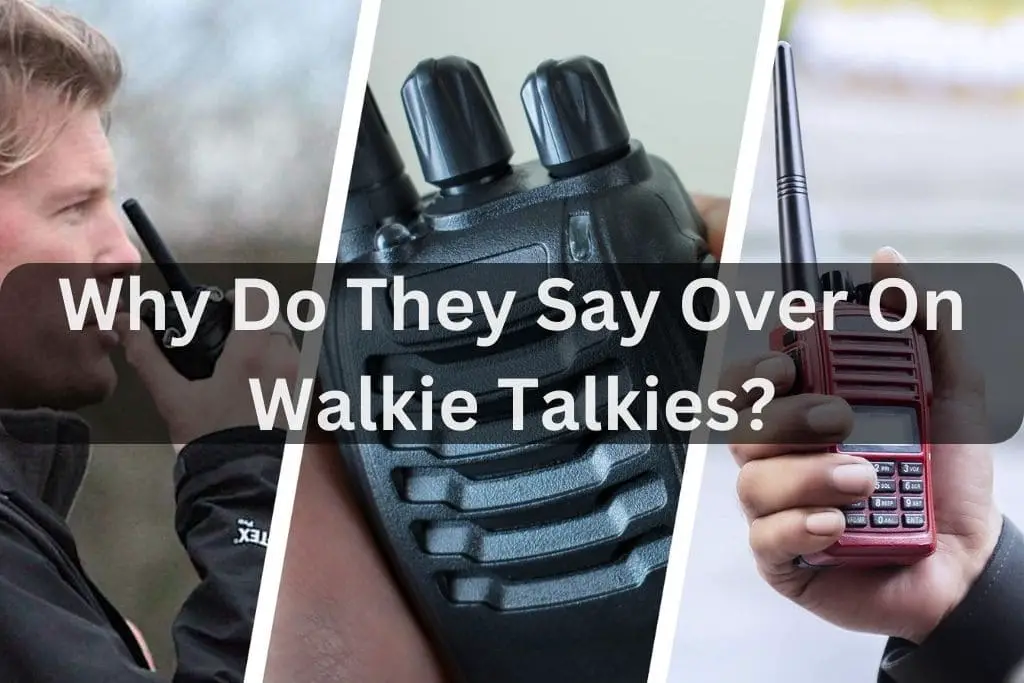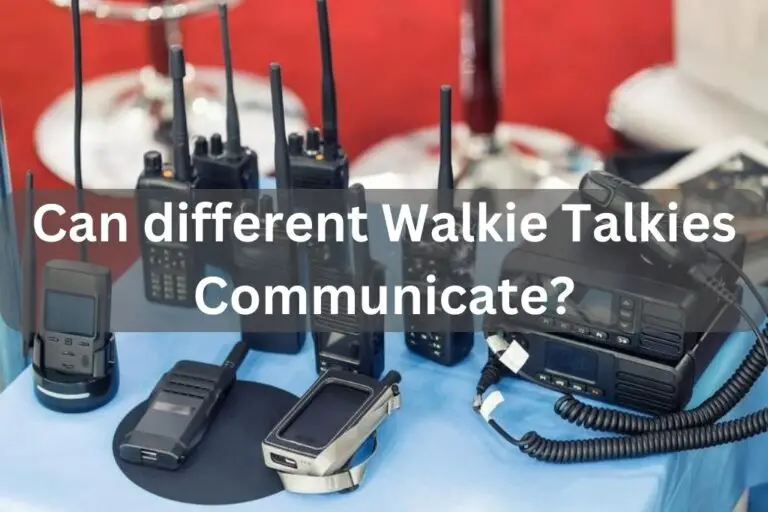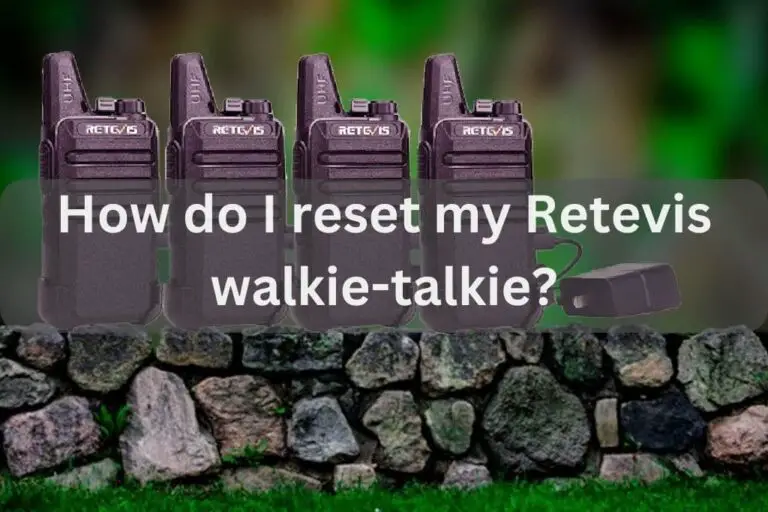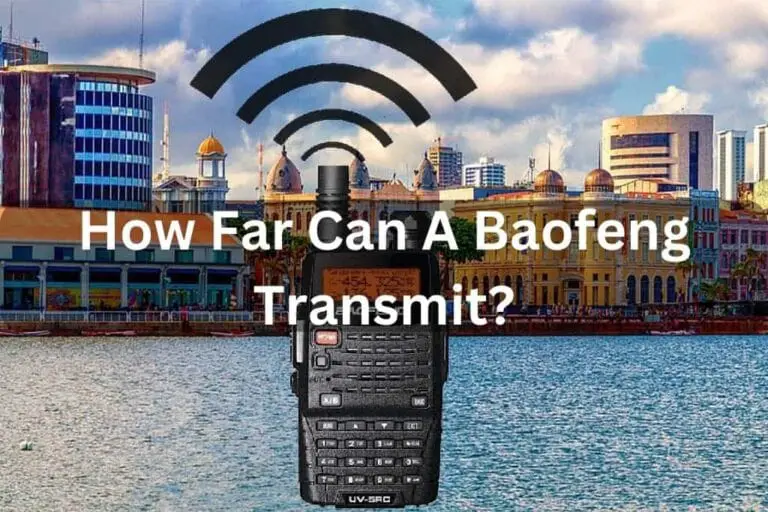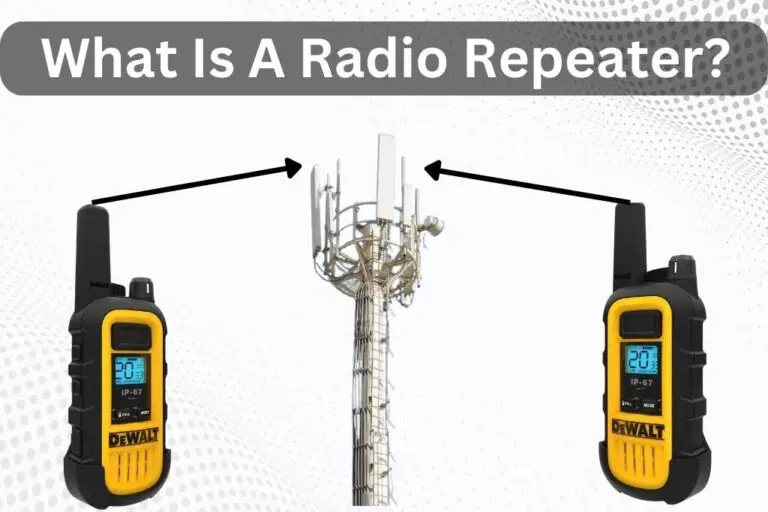Why Do They Say Over On Walkie Talkies? – Walkie Talkie Codes
It is a standard radio protocol in various settings, including emergency response, military operations, and outdoor recreation.
Radio operators use terms like “over,” “break,” “out,” and “copy” when communicating via two-way radio.
Understanding and using these terms appropriately can help to ensure efficient communication on a walkie talkie.
As I mentioned above, Why Do They Say Over On Walkie Talkies? You need to know this exceptionally well. After one person finishes speaking, they will say “over” for the other to respond.
Doing this ensures that both parties know the appropriate time to speak, preventing overlapping conversations.
To meet all your needs, I have compiled a detailed guide for you.
Why say “break” and “over” on walkie talkies?
To end a transmission on two-way radios, “break” and “over” are used to give the other person a turn to speak.
“Break” is typically used to indicate an urgent or emergency situation, while “over” is used in routine communication.
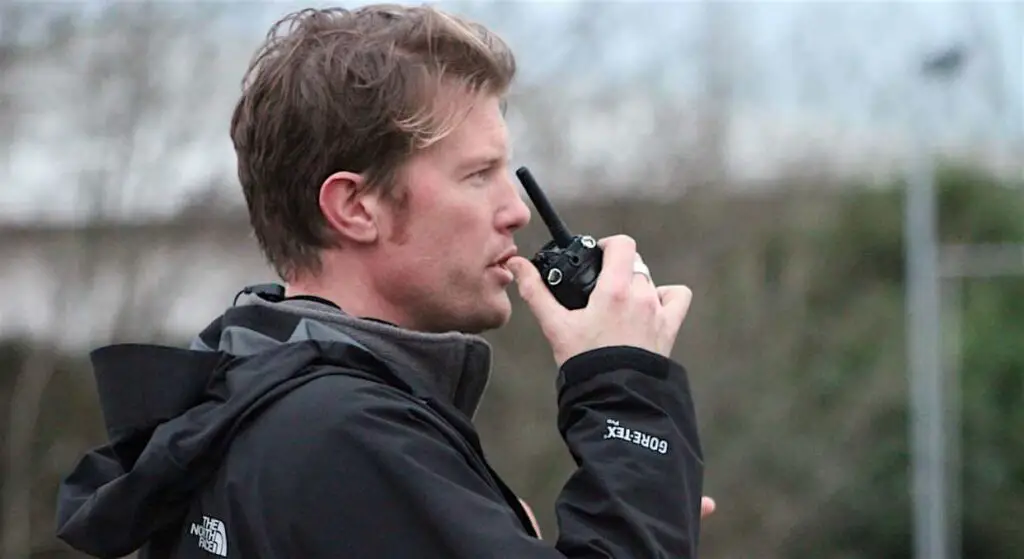
Terms help ensure clear communication on the airwaves because they let people know who should talk and prevent conversations from overlapping.
Using “break” and “over” helps to identify who is speaking on the same radio, especially when multiple people are using it.
Learn The Lingo
Here are some commonly used terms in walkie talkie communication:
“Come in” or “Go ahead” – A request to start communication.
“Over” – Indicates the end of transmission and request for a response.
“Copy that” – Confirmation that the message was received and understood.
“Affirmative” or “Negative” – A positive or negative response to a request.
“ETA” – Estimated Time of Arrival.
“Out” – Indicates the end of transmission and the end of the conversation.
“Break, break” – Used to interrupt a transmission in an emergency.
“What’s your 20?” – Asking for the location of the other person.
“10-4” – Affirmation that the message was received and understood.
“Standby” – Request to wait for further instructions.
It’s important to use standard terminology in walkie talkie communication to ensure clarity and understanding.
Also Read… What Does Adam Mean In Police Code?
Walkie Talkie Conversation Sample
Here’s a sample walkie talkie conversation :
| “RADIO CHECK” | Check that your radio is working. |
| “10-4” OR “COPY” | Used to confirm transmission. |
| “OVER” | End of a sentence, I have finished speaking. |
| “20” | Your location. |
| “WHAT’S YOUR 20?” | Where are you? |
| “ON IT,” | I understand; I’m working on it. |
| “EYES ON” | Has anyone seen someone/something? |
Why Do They Say Over On Walkie Talkies? Detailed Guide
“Over” is a term used on radios to indicate it is the other party’s turn to talk. It is a standard radio protocol that helps ensure precise and organized communication.
Once a person has finished speaking, they signal it’s the other person’s turn by saying “over.” That makes communication more efficient, ensuring people know when to start talking and preventing overlapping conversations.

Using “over” distinguishes speakers on the same channel, which is useful when multiple people use the same radio.
Here is a detailed guide step-by-step on how to use “over” when communicating on a walkie talkie:
- Ensure your walkie talkie is turned on and set to the correct frequency or channel.
- Press and hold the push-to-talk button on your walkie talkie.
- Begin speaking clearly and concisely, stating your message or question. Avoid unnecessary words or filler phrases, as this can reduce communication efficiency.
- Release the push-to-talk button when you finish speaking.
- Look for the other person to respond. They may ask for clarification or provide their response to your message.
- Once the other party has finished speaking, they will say “over” to indicate that it is your turn to respond.
- Press and hold the push-to-talk button again to respond.
- Repeat this process until the conversation is complete.
Remember to use “over” correctly when talking on a walkie talkie for more precise communication.
Why do you say over on a walkie talkie?
“Over” is typically used with the push-to-talk function of a walkie talkie. Click and hold the PTT button on the device. Speak message or question Release button.
Two people can talk using a push-to-talk button, taking turns speaking and saying “over” when done. This back-and-forth process continues until the conversation is complete.
Walkie talkie communication is better by using the word “over” to indicate the end of a person’s turn to talk so that the other person can start speaking without any confusion.
Remember to use “over” correctly when using a walkie talkie to communicate clearly.
Why do people talk differently in walkie talkies? Step By Step
| Code | Basic Conversion |
| “STANDING BY” | I’m waiting for more instruction. |
| “Flying In” | When someone or an item is en route to its destination. |
| “Switching” | Changing the radio station. |
| ” Walkie Talkie Test” | Initial check when you first turn on your walkie talkie to make sure it’s working. |
| “KEYING” “keying!” or “someone’s keying.” | When someone is accidentally holding down the “talk” button on their walkie talkie so people can hear them. Someone will call this out by saying, “Keying!” or “Someone’s keying.” |
| “STAND BY” | Wait. I’m busy right now. |
| “GO AGAIN” / “COME BACK ON THAT” | Repeat the message. |
There are several reasons why people may talk unlikely when using a walkie talkie as compared to normal conversation:
Clarity- Talk clearly and briefly when using a walkie talkie to ensure the other person understands. That may involve speaking slower and more distinctly than in everyday conversation.
Brevity- When using a walkie talkie, keep messages short to save airwave time, which may require you to be more selective in your word choice and to use shorter phrases.
Protocol- Common words used in two-way radio communication include “over,” “break,” and “copy.” Using these terms appropriately helps to ensure clear and efficient communication on the airwaves.
Noise- Walkies talkies used in loud settings, such as construction sites or crowded events. Speaking more loudly or using exaggerated enunciation may make your message more audible over background noise.
Radio static- Walkie talkies can sometimes experience static or interference on the airwaves, making it more challenging to understand who is speaking. In this case, speaking more slowly and distinctly helps reduce confusion.
Improve communication skills when using a walkie talkie. Ensure messages are understood clearly by other parties. Follow these steps
Why do they say over and out on walkie talkies?
“Over” and “out” are terms used on walkie talkies and other two-way radios to indicate the end of a transmission.
“Over” is used in routine communication, while “out” indicates the conversation is ending. Using these terms helps ensure clear and organized communication on the airwaves.
Using these terms appropriately and consistently when using a walkie talkie is important.
“Over” and “out” are terms used on walkie talkies and other two-way radios to indicate the end of a transmission.
“Over” is used in routine communication, while “out” indicates the conversation is ending. Using these terms helps ensure clear and organized communication on the airwaves.
Using these terms appropriately and consistently when using a walkie talkie is important.
Do you have to say over on a walkie talkie?
“Over” is used on walkie talkies and radios to end a transmission and let the other person talk.
Ending a transmission with “over” lets the other person know it’s their turn to talk and prevents overlapping conversations.
Using “over” helps to clearly distinguish between different speakers on the same channel. Using “over” is important in effective communication on a walkie-talkie.
Why Do They Say Over And Out On Walkie Talkies?
“Over” and “out” are terms used on walkie talkies and other two-way radios to indicate the end of a transmission.
“Over” is used in routine communication, while “out” indicates the conversation is ending.
Using these terms appropriately and consistently when using a walkie talkie is crucial.
“Over” and “out” are terms used on walkie talkies and other two-way radios to indicate the end of a transmission.
“Over” is used in routine communication, while “out” indicates the conversation is ending.
Using these terms appropriately and consistently when using a walkie talkie is essential.
Do You Have To Say Over On A Walkie Talkie?
“Over” is used on walkie talkies and radios to end transmission and let the other person talk.
Ending a transmission with “over” lets the other person know it’s their turn to talk and prevents overlapping conversations.
Using “over” helps to clearly distinguish between different speakers on the same channel. Using “over” is essential in effective communication on a walkie talkie.
What do you say to end conversation over walkie talkie?
There are various ways to end a conversation on a walkie talkie:
- “Over and out”: Indicating the end of a conversation, radio transmission, or presence.
- “Copy that, out”: This phrase acknowledges the other party’s message and indicates that the conversation is ending.
- “I’m clear” indicates that the user has finished speaking and the conversation is over.
- “Break, break” means an urgent or emergency and is typically followed by a message or request. After the delivery of the message, the conversation ended with “over and out.”
What Are The Walkie Talkie Codes?
There are several codes and terminology that used in walkie talkie communication:
- “Break”: Indicates an urgent or emergency.
- “Copy”: Acknowledges receipt of a message.
- “Out” indicates that the conversation is ending, the radio is Getting turned off, or the user is leaving the area.
- “10 codes”: A set of codes used to communicate common phrases, such as “10-4” (acknowledgment), “10-20” (location), and “10-33” (emergency).
Understanding and appropriately using these codes and terminology is significant to ensure clear and efficient communication on a walkie-talkie.
Final Thought :
You are now correctly informed about Why Do They Say Over On Walkie Talkies? “Over” is a term used on walkie talkies to signal the end of a transmission and allow the other person to respond.
It additionally serves to aid in clear communication and avoids interruptions or overlaps during a conversation.
The speaker is giving the listener permission to start speaking by saying “over.” It helps keep the conversation organized and allows both parties to understand each other clearly.
Also Read
How Long Do Walkie Talkie Batteries Last? Save Your Battery
Can different Walkie Talkies Communicate? – Best Talk about
